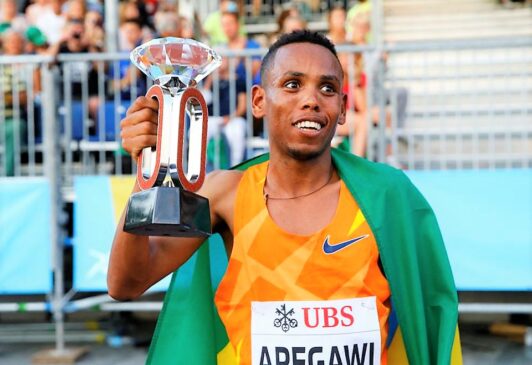IAAF History: Ethiopian & African Athletes

African athletes have made a huge contribution to the sport, with the continent’s illustrious history stretching back to even before the formation of the IAAF.
South Africa formed a national federation in 1894 and it was a sprinter from that country, Reggie Walker, who became the first African to win an Olympic gold medal when he took the 100m title in 1908.
However, African athletes gained greater prominence from the late 1950s onwards as many countries gained their independence and were determined to play a bigger role on the sporting stage.
A pivotal point was the famous barefoot marathon victory by Ethiopia’s Abebe Bikila at the 1960 Olympic Games in Rome, striding through the night sky to equal the world best time.
Bikila, this time wearing shoes, retained his title in Tokyo four years later with another world record.
Kenya made its mark at the 1968 Olympics in Mexico City with Kip Keino capturing the hearts of athletics aficionados with his courageous front running to win the 1500m.
In the 1970s, Africa gave the world several great champions and World record setters like Uganda’s 400m hurdler John Akii-Bua and Tanzania’s 1500m runner and steeplechaser Filbert Bayi.
At the 1980 Moscow Olympics, the 5000m and 10,000m champion Miruts Yifter grabbed the headlines but in the decade as a whole it was Morocco’s Said Aouita who took the limelight with five World records over various distances including being the first man to run 5000m in under 13 minutes.
Ethiopia’s Haile Gebrselassie and his compatriot Kenenisa Bekele have then taken 5000m and 10,000m running to new levels in the last 20 years, with both men also winning a myriad of World and Olympic titles.
It would also be remiss not to mention Morocco’s Hicham El Guerrouj, who dominated 1500m races for a decade before achieving a phenomenal 1500m and 5000m double at the 2004 Olympics.
African Women Athletes
Africa’s women, despite often facing social and cultural barriers, quickly followed in the footsteps of their male counterparts.
Morocco’s Nawal El Moutawakil won the 400m Hurdles gold medal at the 1984 Olympics in Los Angeles, beating Aouita to the honour of being her country’s first gold medallist by three days.
The 1992 Olympics in Barcelona was another watershed for Africa’s women.
Algeria’s Hassiba Boulmerka followed up her 1500m victory at the 1991 World Championships with another title while the 10,000m saw a titanic battle in which Ethiopia’s Derartu Tulu prevailed over South Africa’s Elana Meyer.
The pair then went off hand-in-hand on a symbolic shared victory lap to provide a memorable image which symbolised a new era of unity for Africa.
Other great African women athletes of recent vintage include Mozambique’s Maria Mutola, the 2000 Olympic champion who won the IAAF World Championships 800m on three occasions. She was even more dominating at the IAAF World Indoor Championships with seven victories.
Kenya’s Catherine Ndereba won two World titles at the marathon and also set a World record over the classic distance, while Ethiopia’s Tirunesh Dibaba has been a multiple World champion on the track and at cross country, something which Vivian Cheruiyot succeeded at in 2011.
Cameroon’s Françoise Mbango has also shown that African women have talents other than just running and won Triple Jump gold medals at the 2004 and 2008 Olympics.
Source: IAAF



